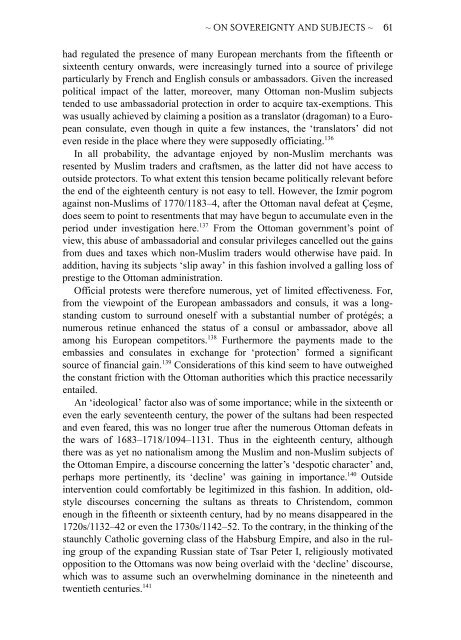The Ottoman Empire and the World Around It - Course Information
The Ottoman Empire and the World Around It - Course Information
The Ottoman Empire and the World Around It - Course Information
You also want an ePaper? Increase the reach of your titles
YUMPU automatically turns print PDFs into web optimized ePapers that Google loves.
~ ON SOVEREIGNTY AND SUBJECTS ~ 61<br />
had regulated <strong>the</strong> presence of many European merchants from <strong>the</strong> fifteenth or<br />
sixteenth century onwards, were increasingly turned into a source of privilege<br />
particularly by French <strong>and</strong> English consuls or ambassadors. Given <strong>the</strong> increased<br />
political impact of <strong>the</strong> latter, moreover, many <strong>Ottoman</strong> non-Muslim subjects<br />
tended to use ambassadorial protection in order to acquire tax-exemptions. This<br />
was usually achieved by claiming a position as a translator (dragoman) to a European<br />
consulate, even though in quite a few instances, <strong>the</strong> ‘translators’ did not<br />
even reside in <strong>the</strong> place where <strong>the</strong>y were supposedly officiating. 136<br />
In all probability, <strong>the</strong> advantage enjoyed by non-Muslim merchants was<br />
resented by Muslim traders <strong>and</strong> craftsmen, as <strong>the</strong> latter did not have access to<br />
outside protectors. To what extent this tension became politically relevant before<br />
<strong>the</strong> end of <strong>the</strong> eighteenth century is not easy to tell. However, <strong>the</strong> Izmir pogrom<br />
against non-Muslims of 1770/1183–4, after <strong>the</strong> <strong>Ottoman</strong> naval defeat at Çeşme,<br />
does seem to point to resentments that may have begun to accumulate even in <strong>the</strong><br />
period under investigation here. 137 From <strong>the</strong> <strong>Ottoman</strong> government’s point of<br />
view, this abuse of ambassadorial <strong>and</strong> consular privileges cancelled out <strong>the</strong> gains<br />
from dues <strong>and</strong> taxes which non-Muslim traders would o<strong>the</strong>rwise have paid. In<br />
addition, having its subjects ‘slip away’ in this fashion involved a galling loss of<br />
prestige to <strong>the</strong> <strong>Ottoman</strong> administration.<br />
Official protests were <strong>the</strong>refore numerous, yet of limited effectiveness. For,<br />
from <strong>the</strong> viewpoint of <strong>the</strong> European ambassadors <strong>and</strong> consuls, it was a longst<strong>and</strong>ing<br />
custom to surround oneself with a substantial number of protégés; a<br />
numerous retinue enhanced <strong>the</strong> status of a consul or ambassador, above all<br />
among his European competitors. 138 Fur<strong>the</strong>rmore <strong>the</strong> payments made to <strong>the</strong><br />
embassies <strong>and</strong> consulates in exchange for ‘protection’ formed a significant<br />
source of financial gain. 139 Considerations of this kind seem to have outweighed<br />
<strong>the</strong> constant friction with <strong>the</strong> <strong>Ottoman</strong> authorities which this practice necessarily<br />
entailed.<br />
An ‘ideological’ factor also was of some importance; while in <strong>the</strong> sixteenth or<br />
even <strong>the</strong> early seventeenth century, <strong>the</strong> power of <strong>the</strong> sultans had been respected<br />
<strong>and</strong> even feared, this was no longer true after <strong>the</strong> numerous <strong>Ottoman</strong> defeats in<br />
<strong>the</strong> wars of 1683–1718/1094–1131. Thus in <strong>the</strong> eighteenth century, although<br />
<strong>the</strong>re was as yet no nationalism among <strong>the</strong> Muslim <strong>and</strong> non-Muslim subjects of<br />
<strong>the</strong> <strong>Ottoman</strong> <strong>Empire</strong>, a discourse concerning <strong>the</strong> latter’s ‘despotic character’ <strong>and</strong>,<br />
perhaps more pertinently, its ‘decline’ was gaining in importance. 140 Outside<br />
intervention could comfortably be legitimized in this fashion. In addition, oldstyle<br />
discourses concerning <strong>the</strong> sultans as threats to Christendom, common<br />
enough in <strong>the</strong> fifteenth or sixteenth century, had by no means disappeared in <strong>the</strong><br />
1720s/1132–42 or even <strong>the</strong> 1730s/1142–52. To <strong>the</strong> contrary, in <strong>the</strong> thinking of <strong>the</strong><br />
staunchly Catholic governing class of <strong>the</strong> Habsburg <strong>Empire</strong>, <strong>and</strong> also in <strong>the</strong> ruling<br />
group of <strong>the</strong> exp<strong>and</strong>ing Russian state of Tsar Peter I, religiously motivated<br />
opposition to <strong>the</strong> <strong>Ottoman</strong>s was now being overlaid with <strong>the</strong> ‘decline’ discourse,<br />
which was to assume such an overwhelming dominance in <strong>the</strong> nineteenth <strong>and</strong><br />
twentieth centuries. 141


